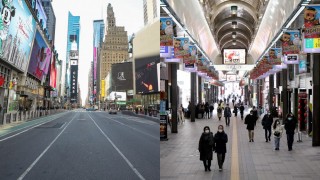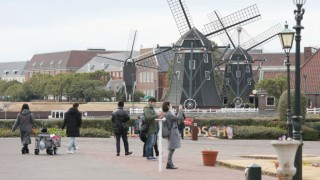Loading
Search
▼ Japan Quietly Reopens As Much Of World Locks Down
- Category:Event
Spared a national curfew, businesses weigh health and economic risks
NAGASAKI/TOKYO -- Businesses and schools in Japan are gradually moving out of a voluntary shutdown called for by Prime Minister Shinzo Abe last month, as the coronavirus crisis brings into focus the question of how to balance the economy and public health.
In Nagasaki Prefecture, the Dutch-themed resort Huis Ten Bosch reopened on Monday, but visitors are asked to wear masks and no one with a temperature higher than 37.5 C is admitted. Only outdoor attractions are open for now.
Experts say such safety measures could become a permanent feature at shopping centers and other high-traffic locations as the fight against the coronavirus drags on, with a vaccine seen as months away.
Huis Ten Bosch's decision illustrates the difficult choice faced by schools and businesses three weeks after Abe's Feb. 27 public appeal -- which stopped short of locking down wide areas of the country, as Italy has done.
"There were arguments both for and against reopening the park within our company, but the final decision was made by me, " said Katsuhiko Sakaguchi, president of the theme park, a unit of Japanese travel agency H.I.S. "I understand I've made a grave decision. We will take steps to prevent any outbreak," he added.
Economic pressure is especially intense in smaller cities and rural areas, which have been hit hardest by the sudden grounding of tourism, even as Abe's own medical experts point out that the number of cases is still on the rise and that the risk of rapid spread remains.
On Thursday, the government's panel of coronavirus experts made an interim assessment of the situation in Japan, saying the outbreak has been kept under control -- but only barely. Still, the panel advised the government to allow the easing of restrictions in places where no new cases have been reported.
Over 900 cases of COVID-19 had been confirmed as of Thursday morning, of which 191 patients had recovered and 32 had died, according to public broadcaster NHK. These numbers do not cases on the now-evacuated Diamond Princess cruse ship.
In the northern island of Hokkaido, which has the highest number of COVID-19 cases in the country, Gov. Naomichi Suzuki announced that a three-week state of emergency would be lifted on Thursday. Citizens had been advised to stay home and not go out on weekends.
Along with China and South Korea, Japan was among the countries hit earliest by the coronavirus outbreak, before it advanced to Europe and North America, where it is still spreading. New York City recently announced the closure of schools and shutdown of restaurants, while the U.K. finally announced school closures on Wednesday.
"From the point of view of prevention, staying at home is desirable, but it has to be taken into consideration what its effect will be on the economy and people's lives," said Jiro Yasuda, professor of virology at Nagasaki University. "It will have a devastating effect on the economy."
On Wednesday, the U.N.'s International Labor Organization issued a dire warning that the coronavirus could cause the loss of as many as 25 million jobs worldwide and drain up to $3.4 trillion in income this year.
"The regional economies tend to depend on tourism," said Takumi Fujinami, an analyst at the Japan Research Institute.
"They cannot afford to keep businesses grounded for too long. They want to see shops reopened where possible." The move also represents an effort by local businesses to shift back to the domestic market amid a deep freeze in inbound tourism.
Abe's request prompted the cancellation or postponement of professional baseball games, soccer matches, trade shows, symposiums, parties, corporate meetings and business trips. But no curfew has thus far been imposed on outings, as in Italy or France, or in China's Wuhan, the epicenter of the outbreak.
The tourism industry is among the sectors impacted most severely by the coronavirus crisis in Japan, amid a sharp fall in travelers from within and from outside the country. Extended closure is seen as the death knell for theme park operators like Huis Ten Bosch.
According to Mitsuhiro Harada, an analyst at credit research company Tokyo Shoko Research, companies in the entertainment sector are likely to run into trouble after two or three months without business. The situation would be worse for companies that made major investments and face heavy depreciation charges or have extensive debt.
The Moominvalley theme park in Saitama, featuring the Finnish children story character Moomin, also resumed operations on March 14, having opened just last year.
Like Huis Ten Bosch, guests at the park have their temperatures checked at the entrance and are denied admission if they have a fever. Some facilities take only a limited number of guests to avoid congestion, and the park conducts more frequent cleaning and air ventilation than before. It is owned by FinTech Global, a boutique investment bank in Tokyo.
Near Mount Fuji, the GrinPa Amusement Park reopened on March 9, although its operator, outdoor resort company Pica, says only outdoor attractions are in service. Staff check the temperature of each guest with a thermometer gun, or an infrared sensor. The park isn't usually crowded at this time of year, but guests are being asked to keep one meter away from each other when they form a line and the popular Sylvanian Families characters give no handshakes, to prevent infection.
Even indoor amusement facilities are reopening.
Cinema operator Aeon Entertainment, part of retail group Aeon, restarted theaters on March 16 in some areas including Hokkaido, Nagoya and Osaka, after they were closed for two weeks due to local virus outbreaks.
Aeon's other cinemas have been operating as usual during these period, and they have introduced safety measures such as setting empty seats between each visitor, a spokesperson said.
Bandai Namco Amusement, an operator of about 230 game arcades across Japan, resumed operations on March 16. The unit of Bandai Namco Holdings said it has instituted health-safety guidelines, including limiting the number of guests, having the temperature checked before admission to some of its attractions, leaving the doors and windows open for better ventilation, and disinfecting the attractions regularly.
But the company admitted that "it is impossible to guarantee 100% safety" because the virus is hard to detect.
"I won't go to a movie theater," said Nagasaki University's Yasuda. "You sit next to somebody for two to three hours in a relatively small confined space. If the person has the virus, there is a greater risk of getting infected." But he added that commercial facilities should be given an option to do business at their own risk under their own responsibility.
Local education boards have an even bigger responsibility to ensure the safety of their students.
Currently, 95% of elementary and secondary schools are closed in Japan, but some education boards have opted to reopen in response to requests from parents.
The city of Narita, east of Tokyo, is one of them.
All the students in the district's 34 public elementary and middle schools are asked to wear masks during class, except when they are having lunch, and the rule is well-observed even among lower-grade students, said an education board official. Amid shortages, some students are using masks made by their parents.
Students wash their hands with soap upon arrival at school, after a long recess, and before lunch. Lower-grade students are accompanied by their teachers, who make sure they are washing properly.
Previously, lunch was eaten in groups in the classroom, but now everybody sits at their own desks, which are separated from each other, facing the blackboard, without any chatting. No physical education classes are held in the gym, over concern that huffing and puffing would increase the risk of infection. No singing or instrument practice takes place in music classes.
The city of Fujiyoshida, in Shizuoka Prefecture southwest of Tokyo, also reopened schools for its 3,500 elementary and middle-school students.
The city has handed out 10 disposable masks for third-graders and higher, and washable gauze masks for smaller children, said Ruriko Omata, a senior member of the city's education board. The parents are asked to check the temperature of their children every day and report it to the school.
Some school districts defied Abe's request and kept schools open this month, only to be forced to close later due to infections.
The city of Ota in Gunma Prefecture, north of Tokyo, moved to close its schools on March 9, after one resident was infected on March 7.
"From the beginning, we were going to take flexible measures once infection was identified [in the city]," said Takahashi Yoshiya, who is in charge of school education in Ota. He said schools have made efforts to monitor the body temperatures of students and take other safety measures such as ventilation, wider spaces between desks and wearing masks. But "it was not to say that [going to school] was completely immune from the virus," he added.
Nagasaki University's Yasuda said a flexible approach is needed to fight the long battle against the coronavirus.
"The situation can change quickly," he said. "We just need to be flexible and respond to changes quickly."
- March 20, 2020
- Comment (0)
- Trackback(0)



